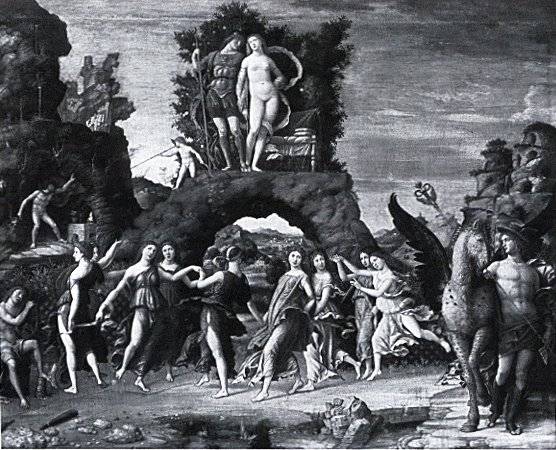|
|
|
Aphrodite
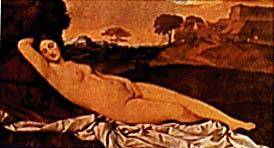
To Aphrodite
You know the place: then
Leave Crete and come to us
waiting where the grove is
pleasantest, by precincts
sacred to you; incense
smokes on the altar, cold
streams murmur through the
apple branches, a young
rose thicket shades the ground
and quivering leaves pour
down deep sleep; in meadows
where horses have grown sleek
among spring flowers, dill
scents the air. Queen! Cyprian!
Fill our gold cups with love
stirred into clear nectar
Sappho
tr. Barnard
.
In her Near-Eastern origins, and Cyprus her half-Oriental home, Aphrodite was first of all a mother goddess; to the end of her tenure she remained associated with reproduction and fertility in the whole realm of plant,animal, and human life. As the civilization became more developed and it's security was increased there was not such a high demand for birthing, the esthetic was left free to see other values in woman than those limited to multiplication. This makes Aphrodite not only the embodiment of the ideal beauty, but the deity of heterosexual pleasure. The Greeks and others have worshiped her in many various forms here are a few of her titles :
Aphrodite
Urania/ The Celestial (the Heavenly Goddess or sky-borne )
Aphrodite
Pandemos ( for all the people, the goddess of profane love in all it's forms)
Aphrodite
Pelagia ( From the Sea),
Aphrodite Kallipygos
(the Venus of the Lovely Nates)
Melaina (The
Black One),
Androphonos
(Killer of Men),
Anadyomene (
Emerging from the Sea),
Dione
(Of the Bright Sky),
Ouranos (Of
Heavenly love)
Aphrodite
Urania, is strong and intelligent, for philosophy and religion the celestial goddess of spiritual love that is
pure. Aphrodite Pandemos is primarily devoted to physical satisfaction. The distinction between sacred and
profane love is one of the most recognized and potent universal truths in the history of civilization. Deity names
such as theses are linked to specific festivals that were used. These names do not always isolate and codify different
aspects of the god /goddess. They are used to help the participants, and the deity to recall previous experiences
and bring that energy fully into the present ritual.
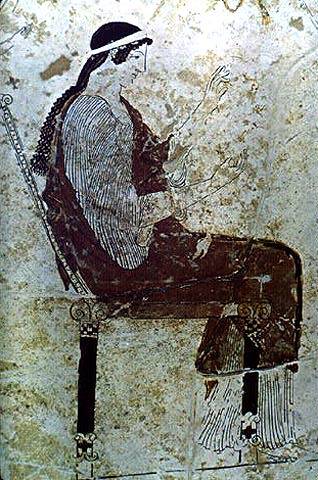
At the beginning of April various cities in Greece celebrated her great festival, the Aphrodisia which on that
occasion for those whom wished to do so could take part, sexual freedom was the calling of the day. Aphrodite was
the goddess of the passionate and sensual south where as Artemis was the love goddess of the cold and hunting north.
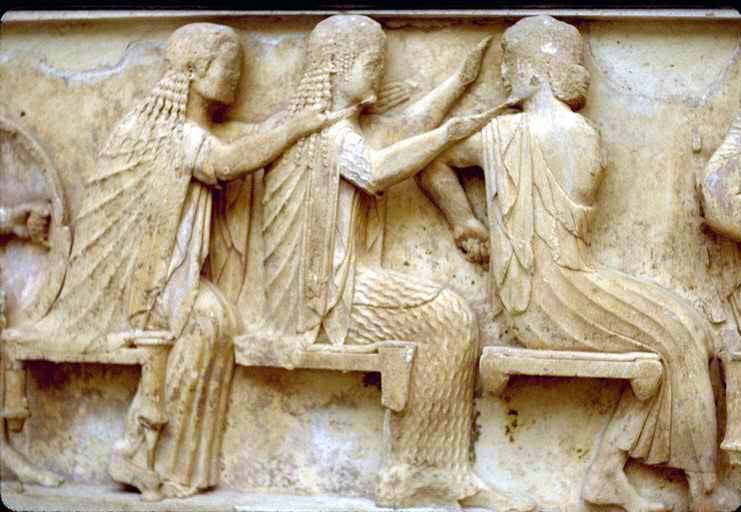
Aphrodite, Artemis and brother Apollo

Blame Aphrodite
It's no use
Mother dear, I
can't finish my
weaving
You may
blame Aphrodite
soft as she is
she has almost
killed me with
love for that boy
Sappho
tr. Barnard
.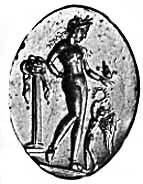
![]()
The Castration of Uranus and the Birth of Aphrodite
Hesiod (Theogany 155-210)
As each of his children was born, Uranus hid them all in the depths of Ge and did not allow them to emerge into the light. and he delighted in his wickedness. But huge Earth in her distress groaned within and devised a crafty and evil scheme. At once she created gray adamant and fashioned a great sickle and confided in her dear children. Sorrowing in her heart she urged them as follows : " My children born of a presumptuous father, if you are willing to obey, we shall punish his evil insolence. For he was the first to devise shameful actions."
Thus she spoke. Fear seized them all and not one answered. But great and wily Cronus took courage and spoke to his dear mother: " I shall undertake and accomplish the deed, since I do not care about our abominable father. For he was the first to devise shameful actions." Thus he spoke. And huge Earth, rejoiced greatly in her heart. She hid in an ambush and placed in his hands the sickle with jagged teeth and revealed the whole plot to him. Great Uranus came leading on night and desirous of love lay on Ge, spreading himself over her completely. And his son from his ambush reached out with his left hand and in his right he seized hold of the huge sickle with jagged teeth and swiftly cut off the genitals of his own dear father and threw them so that they fell behind him. And they did not fall from his hand in vain. Earth recieved all the bloody drops that fell and in the course of the seasons bore the strong Erinyes and the mighty giants (shining in their armor carrying long spears in their hands) and nymphs of ash trees (called Meliae on the wide earth).
When first he had cut off the genitals with adamant and cast them from the land on the swelling sea, they were carried for a long time on the deep. And white foam arose about from the immortal flesh and a maiden grew. First she was brought to holy Cythera, and then from there she came to sea-girt Cyprus. and she emerged a dread and beautiful goddess and grass rose under her slender feet. Gods and men call her Aphrodite, and the foam-born goddess because she grew amid the foam, and Cythera of the beautiful crown because she came to Cythera, and Cyprogenes because she arose in Cyprus washed by the waves. She is called too Philommedes(genital-loving) because she arose from the genitals. Eros attended her and beautiful desire followed her when she was born and when she first went into the company of the gods. From the beginning she has this honor, and among men and the immortal gods she wins as her due the whispers of girls, smiles, deceits, sweet pleasure, and the gentle delicacy of love.
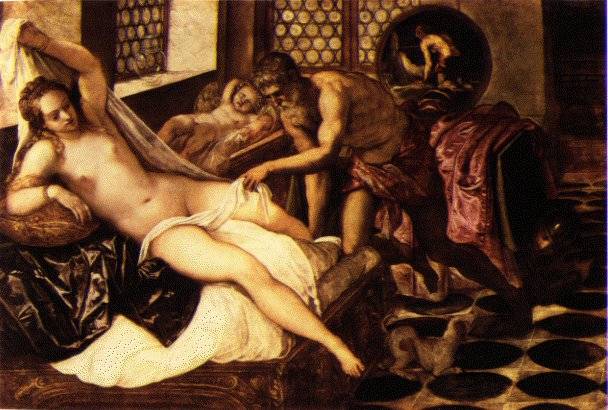
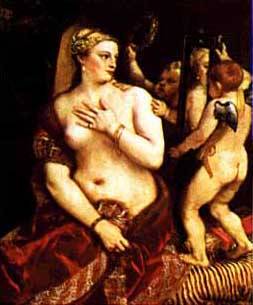
Plato [265a]
Phaedrus: What do you mean?
Socrates: The two discourses were opposites; for one maintained that the lover, and the
other that the non-lover, should be favored.
Phaedrus: And they did it right manfully.
Socrates: I thought you were going to speak the truth and say "madly"; however, that is just what I had
in mind. We said that love was a kind of madness, did we not?
Phaedrus: Yes.
Socrates: And that there are two kinds of madness, one arising from human diseases, and
the other from a divine release from the customary habits.
[265b] Phaedrus: Certainly.
Socrates: And we made four divisions of the divine madness, ascribing them to four gods,
saying that prophecy was inspired by Apollo, the mystic madness by Dionysus, the poetic by the Muses, and the madness
of love, inspired by Aphrodite and Eros, we said was the best.
We described the passion of love in some sort of figurative manner, expressing some truth,perhaps, and perhaps
being led away in another direction, and after composing a somewhat
[265c] plausible discourse, we chanted a sportive and mythic hymn in meet and pious strainto the honor of your
lord and mine, Phaedrus, Love, the guardian of beautiful boys.
Phaedrus: Yes, and I found it very pleasant to hear.
Socrates: Here let us take up this point and see how the discourse succeeded in passing
from blame to praise.

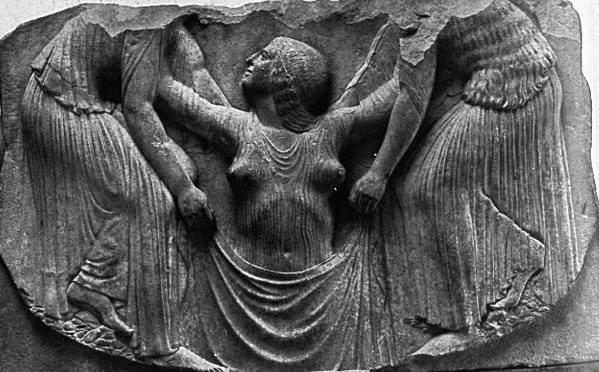
The Homeric Hymn to Aphrodite
I shall sing about Cyprus-born Cytherea,
who gives mortals sweet gifts: on her lovely face, smiles are always suffused with the bloom of love.
Hail goddess, mistress of well-built Salamis and sea-girt Cyprus. Give me a desirable song. Yet I shall remember
you and another song too.
![]()
Welcome Spring, Hail Aphrodite
By:Jennifer H. Wright
Early spring rain
has returned again.
The Great Mother Gaea is quenched from her thirst.
Trees buds stretch forth; ready to burst.
Birds call out,
in a thousand winds of fanciful color.
The cleansing grey winter has been replaced by splendor.
The frozen ponds of yesterday awaken.
Life returns from where is was taken.

Eos erases the traces of night
Aphrodite approaches in the glorious light!
White doves lead before thy lady's way.
Apollo gives a smile and it beams the suns rays!
Iris spreads her rainbow far across the sky.
Oh what a welcome to a season,
What a magnificent day!

Blessed Be Aphrodite
By: Jennifer H. Wright
Blessed be thy fairest lady Aphrodite
She whom never leaves my side
Although in my thoughts she does sometimes hide.
Your Humor and your wit
Are quite baffling I'll freely admit
But somehow that is what makes you all the more attractive.
She the true lady of beauty and mystery,
Tamer and infuriator of hearts throughout history -
Your flame burns on
as does my song and admiration.
Your love my blessing and inspiration.!

Homeric Hymn To Aphrodite (293 lines)
(1-6) Muse, tell me the deeds of golden Aphrodite
the
Cyprian, who stirs up sweet passion in the gods and subdues the
tribes of mortal men and birds that fly in air and all the many
creatures that the dry land rears, and all the sea: all these
love the deeds of rich-crowned Cytherea.
( 7-32) Yet there are three hearts that she cannot bend nor
yet ensnare. First is the daughter of Zeus who holds the aegis,
bright-eyed Athene; for she has no pleasure in the deeds of
golden Aphrodite, but delights in wars and in the work of Ares,
in strifes and battles and in preparing famous crafts. She first
taught earthly craftsmen to make chariots of war and cars
variously wrought with bronze, and she, too, teaches tender
maidens in the house and puts knowledge of goodly arts in each
one's mind. Nor does laughter-loving Aphrodite ever tame in love
Artemis, the huntress with shafts of gold; for she loves archery
and the slaying of wild beasts in the mountains, the lyre also
and dancing and thrilling cries and shady woods and the cities of
upright men. Nor yet does the pure maiden Hestia love
Aphrodite's works. She was the first-born child of wily Cronos
and youngest too , by will of Zeus who holds the aegis, -- a
queenly maid whom both Poseidon and Apollo sought to wed. But
she was wholly unwilling, nay, stubbornly refused; and touching
the head of father Zeus who holds the aegis, she, that fair
goddess, sware a great oath which has in truth been fulfilled,
that she would be a maiden all her days. So Zeus the Father gave
her an high honour instead of marriage, and she has her place in
the midst of the house and has the richest portion. In all the
temples of the gods she has a share of honour, and among all
mortal men she is chief of the goddesses.
( 33-44) Of these three Aphrodite cannot bend or ensnare the
hearts. But of all others there is nothing among the blessed
gods or among mortal men that has escaped Aphrodite. Even the
heart of Zeus, who delights in thunder, is led astray by her;
though he is greatest of all and has the lot of highest majesty,
she beguiles even his wise heart whensoever she pleases, and
mates him with mortal women, unknown to Hera, his sister and his
wife, the grandest far in beauty among the deathless goddesses --
most glorious is she whom wily Cronos with her mother Rhea did
beget: and Zeus, whose wisdom is everlasting, made her his chaste
and careful wife.
( 45-52) But upon Aphrodite herself Zeus cast sweet desire to
be joined in love with a mortal man, to the end that, very soon,
not even she should be innocent of a mortal's love; lest
laughter-loving Aphrodite should one day softly smile and say
mockingly among all the gods that she had joined the gods in love
with mortal women who bare sons of death to the deathless gods,
and had mated the goddesses with mortal men.
( 53-74) And so he put in her heart sweet desire for Anchises
who was tending cattle at that time among the steep hills of
many-fountained Ida, and in shape was like the immortal gods.
Therefore, when laughter-loving Aphrodite saw him, she loved him,
and terribly desire seized her in her heart. She went to Cyprus,
to Paphos, where her precinct is and fragrant altar, and passed
into her sweet-smelling temple. There she went in and put to the
glittering doors, and there the Graces bathed her with heavenly
oil such as blooms upon the bodies of the eternal gods -- oil
divinely sweet, which she had by her, filled with fragrance. And
laughter-loving Aphrodite put on all her rich clothes, and when
she had decked herself with gold, she left sweet-smelling Cyprus
and went in haste towards Troy, swiftly traveling high up among
the clouds. So she came to many-fountained Ida, the mother of
wild creatures and went straight to the homestead across the
mountains. After her came grey wolves, fawning on her, and grim-
eyed lions, and bears, and fleet leopards, ravenous for deer: and
she was glad in heart to see them, and put desire in their
breasts, so that they all mated, two together, about the shadowy
coombes.
( 75-88) But she herself came to the neat-built shelters,
and him she found left quite alone in the homestead -- the hero
Anchises who was comely as the gods. All the others were
following the herds over the grassy pastures, and he, left quite
alone in the homestead, was roaming hither and thither and
playing thrillingly upon the lyre. And Aphrodite, the daughter
of Zeus stood before him, being like a pure maiden in height and
mien, that he should not be frightened when he took heed of her
with his eyes. Now when Anchises saw her, he marked her well and
wondered at her mien and height and shining garments. For she
was clad in a robe out-shining the brightness of fire, a splendid
robe of gold, enriched with all manner of needlework, which
shimmered like the moon over her tender breasts, a marvel to see.
Also she wore twisted brooches and shining earrings in the form
of flowers; and round her soft throat were lovely necklaces.
( 91-105) And Anchises was seized with love, and said to her:
`Hail, lady, whoever of the blessed ones you are that are come to
this house, whether Artemis, or Leto, or golden Aphrodite, or
high-born Themis, or bright-eyed Athene. Or, maybe, you are one
of the Graces come hither, who bear the gods company and are
called immortal, or else one of those who inhabit this lovely
mountain and the springs of rivers and grassy meads. I will make
you an altar upon a high peak in a far seen place, and will
sacrifice rich offerings to you at all seasons. And do you feel
kindly towards me and grant that I may become a man very eminent
among the Trojans, and give me strong offspring for the time to
come. As for my own self, let me live long and happily, seeing
the light of the sun, and come to the threshold of old age, a man
prosperous among the people.'
( 106-142) Thereupon Aphrodite the daughter of Zeus answered
him: `Anchises, most glorious of all men born on earth, know that
I am no goddess: why do you liken me to the deathless ones? Nay,
I am but a mortal, and a woman was the mother that bare me.
Otreus of famous name is my father, if so be you have heard of
him, and he reigns over all Phrygia rich in fortresses. But I
know your speech well beside my own, for a Trojan nurse brought
me up at home: she took me from my dear mother and reared me
thenceforth when I was a little child. So comes it, then, that I
well know you tongue also. And now the Slayer of Argus with the
golden wand has caught me up from the dance of huntress Artemis,
her with the golden arrows. For there were many of us, nymphs
and marriageable maidens, playing together; and an
innumerable company encircled us: from these the Slayer of Argus
with the golden wand rapt me away. He carried me over many
fields of mortal men and over much land untilled and unpossessed,
where savage wild-beasts roam through shady coombes, until I
thought never again to touch the life-giving earth with my feet.
And he said that I should be called the wedded wife of Anchises,
and should bear you goodly children. But when he had told and
advised me, he, the strong Slayer of Argos, went back to the
families of the deathless gods, while I am now come to you: for
unbending necessity is upon me. But I beseech you by Zeus and by
your noble parents -- for no base folk could get such a son as
you -- take me now, stainless and unproved in love, and show me
to your father and careful mother and to your brothers sprung
from the same stock. I shall be no ill-liking daughter for them,
but a likely. Moreover, send a messenger quickly to the swift-
horsed Phrygians, to tell my father and my sorrowing mother; and
they will send you gold in plenty and woven stuffs, many splendid
gifts; take these as bride-piece. So do, and then prepare the
sweet marriage that is honorable in the eyes of men and
deathless gods.'
(143-144) When she had so spoken, the goddess put sweet
desire in his heart. And Anchises was seized with love, so that
he opened his mouth and said:
(145-154) `If you are a mortal and a woman was the mother who
bare you, and Otreus of famous name is your father as you say,
and if you are come here by the will of Hermes the immortal
Guide, and are to be called my wife always, then neither god nor
mortal man shall here restrain me till I have lain with you in
love right now; no, not even if far-shooting Apollo himself
should launch grievous shafts from his silver bow. Willingly
would I go down into the house of Hades, O lady, beautiful as the
goddesses, once I had gone up to your bed.'
(155-167) So speaking, he caught her by the hand. And
laughter-loving Aphrodite, with face turned away and lovely eyes
downcast, crept to the well-spread couch which was already laid
with soft coverings for the hero; and upon it lay skins of bears
and deep-roaring lions which he himself had slain in the high
mountains. And when they had gone up upon the well-fitted bed,
first Anchises took off her bright jewelry of pins and twisted
brooches and earrings and necklaces, and loosed her girdle and
stripped off her bright garments and laid them down upon a
silver-studded seat. Then by the will of the gods and destiny he
lay with her, a mortal man with an immortal goddess, not clearly
knowing what he did.
(168-176) But at the time when the herdsmen driver their oxen
and hardy sheep back to the fold from the flowery pastures, even
then Aphrodite poured soft sleep upon Anchises, but herself put
on her rich raiment. And when the bright goddess had fully
clothed herself, she stood by the couch, and her head reached to
the well-hewn roof-tree; from her cheeks shone unearthly beauty
such as belongs to rich-crowned Cytherea. Then she aroused him
from sleep and opened her mouth and said:
(177-179) `Up, son of Dardanus! -- why sleep you so heavily?
-- and consider whether I look as I did when first you saw me
with your eyes.'
(180-184) So she spake. And he awoke in a moment and obeyed
her. But when he saw the neck and lovely eyes of Aphrodite, he
was afraid and turned his eyes aside another way, hiding his
comely face with his cloak. Then he uttered winged words and
entreated her:
(185-190) `So soon as ever I saw you with my eyes, goddess, I
knew that you were divine; but you did not tell me truly. Yet by
Zeus who holds the aegis I beseech you, leave me not to lead a
palsied life among men, but have pity on me; for he who lies with
a deathless goddess is no hale man afterwards.'
(191-201) Then Aphrodite the daughter of Zeus answered him:
`Anchises, most glorious of mortal men, take courage and be not
too fearful in your heart. You need fear no harm from me nor
from the other blessed ones, for you are dear to the gods: and
you shall have a dear son who shall reign among the Trojans, and
children's children after him, springing up continually. His
name shall be Aeneas , because I felt awful grief in that I
laid me in the bed of mortal man: yet are those of your race
always the most like to gods of all mortal men in beauty and in
stature
( 202-217) `Verily wise Zeus carried off golden-haired
Ganymedes because of his beauty, to be amongst the Deathless Ones
and pour drink for the gods in the house of Zeus -- a wonder to
see -- honored by all the immortals as he draws the red nectar
from the golden bowl. But grief that could not be soothed filled
the heart of Tros; for he knew not whither the heaven-sent
whirlwind had caught up his dear son, so that he mourned him
always, unceasingly, until Zeus pitied him and gave him high-
stepping horses such as carry the immortals as recompense for his
son. These he gave him as a gift. And at the command of Zeus,
the Guide, the slayer of Argus, told him all, and how his son
would be deathless and unageing, even as the gods. So when Tros
heard these tidings from Zeus, he no longer kept mourning but
rejoiced in his heart and rode joyfully with his storm-footed
horses.
( 218-238) `So also golden-throned Eos rapt away Tithonus who
was of your race and like the deathless gods. And she went to
ask the dark-clouded Son of Cronos that he should be deathless
and live eternally; and Zeus bowed his head to her prayer and
fulfilled her desire. Too simply was queenly Eos: she thought
not in her heart to ask youth for him and to strip him of the
slough of deadly age. So while he enjoyed the sweet flower of
life he lived rapturously with golden-throned Eos, the early-
born, by the streams of Ocean, at the ends of the earth; but when
the first grey hairs began to ripple from his comely head and
noble chin, queenly Eos kept away from his bed, though she
cherished him in her house and nourished him with food and
ambrosia and gave him rich clothing. But when loathsome old age
pressed full upon him, and he could not move nor lift his limbs,
this seemed to her in her heart the best counsel: she laid him in
a room and put to the shining doors. There he babbles endlessly,
and no more has strength at all, such as once he had in his
supple limbs.
( 239-246) `I would not have you be deathless among the
deathless gods and live continually after such sort. Yet if you
could live on such as now you are in look and in form, and be
called my husband, sorrow would not then enfold my careful heart.
But, as it is, harsh old age will soon enshroud you --
ruthless age which stands someday at the side of every man,
deadly, wearying, dreaded even by the gods.
( 247-290) `And now because of you I shall have great shame
among the deathless gods henceforth, continually. For until now
they feared my jibes and the wiles by which, or soon or late, I
mated all the immortals with mortal women, making them all
subject to my will. But now my mouth shall no more have this
power among the gods; for very great has been my madness, my
miserable and dreadful madness, and I went astray out of my mind
who have gotten a child beneath my girdle, mating with a mortal
man. As for the child, as soon as he sees the light of the sun,
the deep-breasted mountain Nymphs who inhabit this great and holy
mountain shall bring him up. They rank neither with mortals nor
with immortals: long indeed do they live, eating heavenly food
and treading the lovely dance among the immortals, and with them
the Sileni and the sharp-eyed Slayer of Argus mate in the depths
of pleasant caves; but at their birth pines or high-topped oaks
spring up with them upon the fruitful earth, beautiful,
flourishing trees, towering high upon the lofty mountains (and
men call them holy places of the immortals, and never mortal lops
them with the axe); but when the fate of death is near at hand,
first those lovely trees wither where they stand, and the bark
shrivels away about them, and the twigs fall down, and at last
the life of the Nymph and of the tree leave the light of the sun
together. These Nymphs shall keep my son with them and rear him,
and as soon as he is come to lovely boyhood, the goddesses will
bring him here to you and show you your child. But, that I may
tell you all that I have in mind, I will come here again towards
the fifth year and bring you my son. So soon as ever you have
seen him -- a scion to delight the eyes -- you will rejoice in
beholding him; for he shall be most godlike: then bring him at
once to windy Ilion. And if any mortal man ask you who got your
dear son beneath her girdle, remember to tell him as I bid you:
say he is the offspring of one of the flower-like Nymphs who
inhabit this forest-clad hill. But if you tell all and foolishly
boast that you lay with rich-crowned Aphrodite, Zeus will smite
you in his anger with a smoking thunderbolt. Now I have told you
all. Take heed: refrain and name me not, but have regard to the
anger of the gods.'
( 291) When the goddess had so spoken, she soared up to windy
heaven.
(292-293) Hail, goddess, queen of well-builded Cyprus! With
you have I begun; now I will turn me to another hymn.
![]()

Enchanted By Thy Fair Aphrodite, Praised Be Eros
By: Jennifer H. Wright
Dear sweet goddess I feel your approach,
Your sweet perfume wafting through the air - sending loving thoughts into and unto my mind and spirit.
This is my heart and my home, I am blessed you chose to stay
And that you share with us your eternity.
The gift of your love is the highest blessing.
You are always welcome to grace us with your delights.
Fueling our passions bringing us closer to the eternal light
Oh mistress of the Night possess me in the depths of ecstasy
And release me from my mortality for just a moment while I embrace the Olympic brightness of your being.
II
Praise be Eros keeper of the key, given to my lord which sets us free.
Your gift of celestial wings bestowed in humble grace,
Is the finest you could give and not one to waste..
Your vital energy a gift from above,
One which can only be forged from love.
Deliver us from our earthly pains,
Share with is your wisdoms and astral flame.
Blessed be thy name, holy art thou in your creations,
Pleasurable be your sensations as you enhance our spiritual and physical bliss.
May I be enchanted and embraced by you whom fills the void,
To bring the divine to be reborn.
![]()
Sappho's Aphrodite
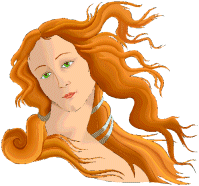
Prayer to Our Lady of Paphos
Dapple-throned Aphrodite,
eternal daughter God,
snare-knitter! Don't, I beg you,
cow my heart with grief! Come,
as once when you heard my far-
off cry and, listening, stepped
from your father's house to your
gold car, to yoke the pair whose
beautiful thick-feathered wings
oaring down mid-air from heaven
carried you to light swiftly
on dark earth; then, blissful one,
smiling your immortal smile
you asked, What ailed me now that
me me call you again? What
was it that my distracted
heart most wanted? "Whom has
Persuasion to bring round now
"to your love? Who, Sappho, is
unfair to you? For, let her
run, she will soon run after;
"if she won't accept gifts, she
will one day give them; and if
she won't love you -- she soon will
"love, although unwillingly..."
If ever -- come now! Relieve
this intolerable pain!
What my heart most hopes will
happen, make happen; you your-
self join forces on my side!
Sappho
tr. Barnard


This is another translation from Classical Mythology" Fourth Edition by Mark P.O. Morford - Robert J. Lenardon.
Exquisitely enthroned, immortal Aphrodite, weaver of charms, child
of Zeus, I beg you, reverend lady, do not crush my heart with sickness and distress. But come to me here, if ever
once before you heard my cry from afar and listened and, leaving your father's house, yoked your chariot of gold.
Beautiful birds drew you swiftly from heaven over the black earth through the air between with rapid flutter of
their downy wings.
Swiftly they came and you, O blessed goddess, smiling in your immortal beauty asked what I wished to happen most
of all in my frenzied heart. "Who is it this time you desire that Persuasion entice to your love?" Who,
O Sappho, has wronged you? For if she runs away now, soon she will follow; if she does not now, soon she will love,
even though she does not wish it."
Come to me now too and free me from my harsh anxieties; all that my heart longs for, accomplish. You, your very
self, stand with me in my conflict.
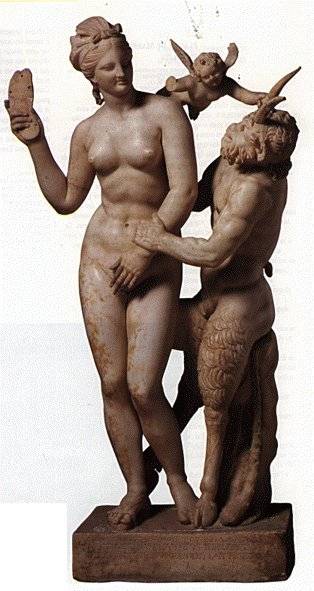
.
![]()
Aphrodite & Her Beloved Adonis
The story of Adonis is one of the more well
known ones I am sure you may
have heard of it at some point. But this is how the story is known to us and we
will share it with you now..
One day, the queen of King Cinyras the Cyprian had made the same mistake the
miller did in the story of Rumplstilskin and pronounced to all that her
daughter Smyrna was so fair she was far more beautiful than Aphrodite herself. Not a
good idea to this, do not try that at home or anywhere else for that
matter...<grin> Any ways to continue with our story... Aphrodite was really ripped about
this and took upon revenge by making Smyrna fall in love with her own father! The nurse made the king drunk to
the point he lost control of his senses and not realize that he was
sleeping with his own daughter. Later, Cinyras finds out that he is to be a father and a grandfather to the unborn
babe. He explodes and gets his sword and
was about to slice her into several bits if not just in two. However
Aphrodite quickly transforms the young woman into a myrrh tree. The tree is thrust upon and is
split down the center. Out tumbled the infant Adonis. So handsome was this youth Aphrodite wanted him for her own.
She concealed him within a chest and entrusted it to Persephone, Queen of the dead. Persephone's curiosity eventually
got the better of her and she opened the
chest and discovered Adonis. She kept him with her at her palace and had fallen in love with him. Upon hearing
this news Aphrodite returns to Tartarus to claim him back. Persephone refuses and seek Zeus to help settle the
dispute. Zeus being wise as he is would not judge such a dispute and sends the case to be presided over by the
muse Calliope. Calliope's verdict was that both Goddesses heed equal claims on Adonis but he of both. So she divided
the year into three equal parts, of which he would spend one with Persephone, and the other with Aphrodite, and
the third by himself. Aphrodite being well Aphrodite did not play fair though it is
said she would be wearing the infamous magick girdle all the time and persuaded
Adonis to give his share of the year to be sent with her as well.
The soap opera continues....
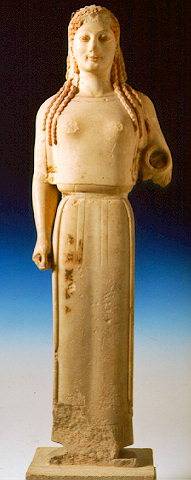
Persephone
Of course Persephone was not happy about this so she tells Ares, about what Aph had been doing. And he of course
being 100% testosterone is quite angrily jealous.He transforms himself into the shape of a boar and kills Adonis
when he is
out on a hunt. This is a true tragedy.... she finds her love dead and the goddess of love
first feels what it is like to have her heart break. From her tears and the blood
of her lover Adonis she created the Anemone.Aphrodite goes to Zeus and pleas that Adonis should not have to spend
more than the gloomier half of the year with Persephone, but he could be her companion in the summer months.
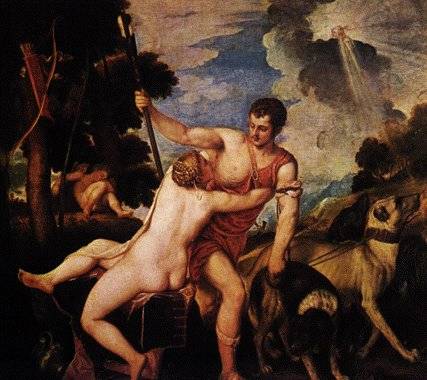
![]()
Aphrodite,
Hephaistos & Ares in History
(These three are grouped together to illustrate the importance of their relationships in a historical and mythical background. Each shall have their own profiles in another section for further reading of interest.)
After the Ice Age the human population was very small and there was great need to reproduce in order to intact the survival of our species. Life expectancy at that time was not more than forty years, usually half the children born would usually die before reaching their third birthday. A rise in population marks the difference between man hunter/gatherer and his decedent man the agriculturist / animal breeder. When the numbers of a population increase they must find means to supply the demands that call for supporting themselves.
Greece's problems with population can be compared to the developing new world of America into the nineteenth century when the United States was facing the challenge of "new land". This consisted of all the problems of constructing a civilization into a single century, large families were a great necessity. If a woman a were impregnated with thirteen children and eight survived and if four of them were male then the farmers could look forward to getting enough workers to fill the needs of a small farm. By the breeding of ones ones workers it ensured survival if it failed so did the farms.
Which leads our discussion towards the eternally charming, ever lovely and flirtatious Aphrodite. Of course in a more primitive society her role for the people fills a very important one. Sex is the only pleasure that leads to procreation that would be vital to a developing society. As a major deity she represents the magickal function of sex now associated with the area of genetics After the Ice Age was coming to pass there was a development of grain hybrids which helped make the population increase happen, however this required an even larger number still of people whom would sow, reap, harvest and protect the food supply.

Hephaistos
as Aphrodite's husband considered by many one of the most unlikely pairs. Hephaistos the Smith-god is
not at all pleasing to the eye to look upon. In fact his appearance was so horrid it is said it both disgusted
and embarrassed his mother Hera. She dropped him from the very heights of Olympus to rid herself from this burden.
Fortunate for him he survived the great plummet for he fell into the sea. Thetis and Eurynome rescued him. The
gentle goddesses always treated him with kindness and care and in return he made them all sorts of ornamental and
useful objects in the smithy he set up in an under water grotto. After nine years had come to pass Hera met Thetis
wearing an exquisite brooch and she asks her "Where in the world did you find that wonderful jewel?"
Thetis resisted answering but eventually Hera forced the truth from her. At Once she fetches Hephaestus and returns
him to Mt. Olympus. He was set up the finest smithy and arranged to marry the fair Aphrodite.
Consider this when coupled with Aphrodite's abilities with his own we have two basic components for a civilization - tools and progeny. This changes however, the maker of tools becomes subsidiary for a new man of power - the military man. Enter Ares whom assumes Hephaistos's role and his wife. The new couple standing at the head of an advancing society.
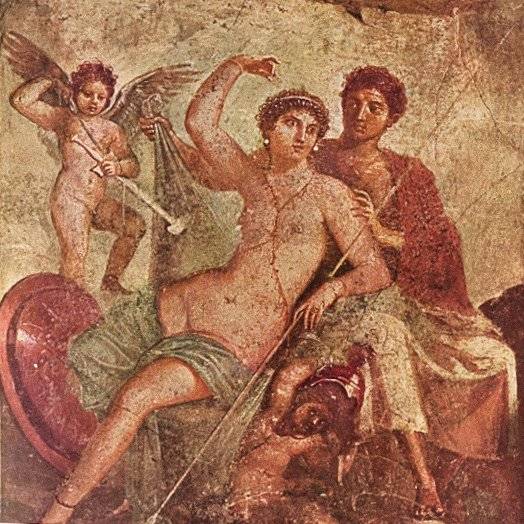
For those not familiar with the myth where Aphrodite commits adultery here is a rough outline of what had happened -
Aphrodite presented to Hesphaestus three
children - Phobus, Deimus, and Harmonia but she deceived him for the true father was Ares. Hephaistos was not wise
or suspect anything of her unfaithfulness until one night the lovers remained too long in each others arms at Ares
Thracian palace and were seen by Helius as he rose. Helius reported his discovery to the smith. Hephaistos in his
anger forged a bronze hunting net, as fine as a gossamer but indestructible. He secretly laid it as a trap in his
marriage bed. He then informed Aphrodite that he is taking a short holiday on Lemnos (his favorite island). Aphrodite
did not suggest she travel with him but instead waited until her husband departed and called for Ares to be with
her.After a night of enjoying each others company in the thralls of passion they awoke to find that they had been
snared and entangled in the net placed by Hephaistos.
He surprises them and summons all the gods to witness his dishonor. Then he announces that he will not release
the pair until his marriage gifts he paid Zeus were returned. While this was going on off to the side Hermes was
having a chat with Apollo who asks Him if he would mind being in Ares position even with the net. Hermes swears
that he would not, even if it were three times as many nets and all the goddesses were looking on. ( The goddesses
themselves were not attending the festivities that day as they had a sense of delicacy and stayed in their homes.)
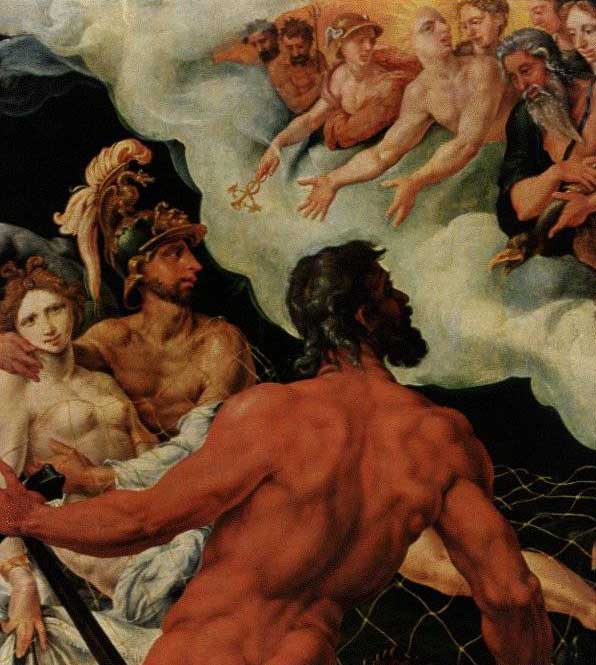
Homer tells us this is what Apollo had said :
"Hermes, son of Zeus....wouldst thou in sooth be willing even though ensnared with strong bonds, to lie on a couch by the side of golden Aphrodite?"Then the messenger answered him "Would that this might befall, Lord Apollo, that thrice as many bonds inextricable might clasp me about, and that ye gods -aye, and all the goddesses, too--might be looking on, but that I might sleep by the side of golden Aphrodite."
Zeus refused to hand back the marriage gifts nor did he want to interfere. Poseidon faked sympathy with Hephaestus and offered to help out since his brother would not. He suggests that he will undertake that of Ares, as a fee for his release, pays the equivalent of the marriage gifs in question. Hephaistos gloomily agrees and adds that if Ares defaults, you will have to take his place under the net. Poseidon said he could not think that Ares would default, but if he were to do so he was willing to pay the debt and marry Aphrodite himself. And so it was that Ares was set at liberty and he returned to Thrace, and Aphrodite headed to Paphos where she renewed her virginity in the sea.
To the military man the easiest way to increase the gross national product is to take it from someone else and
wage war with them. Barter is the first stage of economic transfer, buying did not appear until much later.We know
of military force as early as the sixth millennium B.C., we could date the Aphrodite/Hephaestus dyad back somewhere
towards the eighth millennium, which allows just enough time for the important developments in agriculture which
follow the last ice age .
